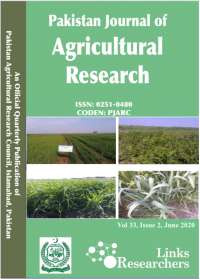Effect of Foliar Applied Magnesium Sulphate and Irrigation Scheduling on Quality and Yield of Maize Hybrid
Effect of Foliar Applied Magnesium Sulphate and Irrigation Scheduling on Quality and Yield of Maize Hybrid
Muhammad Rehan Aslam1, Muhammad Maqsood1, Zahoor Ahmad2*, Sajjad Akhtar3, Muhammad Rizwan4 and Muhammad Usama Hameed5
ABSTRACT
The application of nutrients to crops at different development stages can enhance their yield and also adjust water stress levels. The aim of this study was to evaluate the effect of different levels of foliar applied magnesium sulphate and irrigation scheduling on the quality and yield of maize (Zea mays). Maximum cob weight without sheath (253.38 g), number of grains per cob (472.49), 1000-grains weight (265.99 g), biological yield (13.08 t ha-1), grain yield (5.05 t ha-1), harvest index (38.43%), grain protein contents (8.09%) and grain oil contents (4.76%) were obtained when two foliar sprays of 0.5% MgSO4 (T2) were applied. Similarly, highest cob weight without sheath (258 g), number of grains per cob (475.1), 1000-grains weight (272.5 g), biological yield (13.4 t ha-1), grain yield (5.15 t ha-1), harvest index (38.20%), grain protein contents (9.01%) and grain oil contents (4.76%) were recorded where irrigation was applied at 50 mm soil moisture deficit (I2). Two foliar sprays of 0.5% 0f MgSO4 (1st after 20 days of sowing and 2nd after 30 days of sowing) and irrigation at 50 mm soil moisture deficit were recommended for the improvement of quality and yield of maize.
To share on other social networks, click on any share button. What are these?






